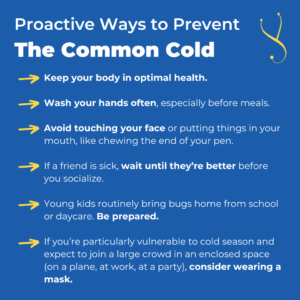How to Prevent the Common Cold: Is It Possible?
If there’s one thing every patient wants to know, it’s how to prevent a cold.
It’s an ailment nearly all of us experience about two or three times a year (kids, even more frequently).
Having a cold makes us feel wretched and can disrupt our day-to-day lives as we struggle to fight the virus.
Respiratory Infections
Whether it’s a cold or something more flu-like, doctors call these upper respiratory tract infections. The vast majority of upper respiratory tract infections — from sinus infections to bronchitis to sore throat — are caused by viruses, not bacteria. Unfortunately, we swim in a veritable ocean of these viruses as we go about our daily lives. Whether it’s the person sneezing ahead of us in line at the grocery store, the waiter who coughed on his hand while putting out silverware, the choir singer at church, or the grandchild reaching up for a hug, we are exposed everywhere.
At this time, few medications exist to treat these bothersome viral infections, although the situation is improving. We now have effective treatments for two serious respiratory illnesses: flu and COVID-19.
But when it comes to how to prevent the common cold — or clear it up quickly — there are still no miracle preventives or treatments.
Many viruses, of course — RSV, coronavirus, flu — can mimic cold symptoms. These viruses come in several strains with varying severity levels (as tracked by the North Carolina Department of Health), and their symptoms can be muddled and confusing. While there tend to be some similarities in the symptoms a virus causes people, there will be individual differences in symptoms and severity of those symptoms.
As your sickness runs its course, your physician can run tests to determine if your “cold” isn’t actually a cold and focus on providing as much relief as possible.
But if you come down with rhinovirus, a leading cause of the common cold, your body must battle the bug naturally. To help that process, your Signature Healthcare doctor will advise you on how to minimize symptoms.
Common Cold Symptoms
You may be surprised to learn that your uncomfortable cold symptoms don’t come from the bug itself but from your natural defenses against it.
These common cold symptoms are proof your body’s fighting back against the viral invader:
- Fever and chills: Your system “turns up the thermostat,” making the body less hospitable for infectious pathogens to replicate.
- Runny nose: Your nose mounts its own defense as it works to flush out bacteria or viruses there.
- Cough: Your body seeks to eliminate infectious mucus dripping into your airway to help you breathe better.
- Congestion: Your nasal passages and sinuses create virus-fighting inflammation.
- Laryngitis: Your larynx, the area of the voice box, becomes inflamed as it battles infection.
- Pharyngitis (sore throat): Similarly, throat tissues become inflamed to contend with infection.
- Bronchitis: Protective inflammation of your airways produces mucus and coughing.
Effective OTC Cold Treatments
Doctors get colds just like everyone else. If I feel one coming on, I evaluate my symptoms and start treating them with some effective over-the-counter (OTC) medications:
Headache, fever, chills, and body aches
I reach for a nonsteroidal anti-inflammatory drug (NSAID) and likely add some Tylenol (acetaminophen), too.
For convenience, certain available OTC products combine both NSAIDs and acetaminophen in a single drug. Another approach is to alternate NSAIDs (Advil, Tylenol, Advil, Tylenol…) every three hours or so.
Congestion and trouble breathing
Start with an OTC decongestant medication:
- Phenylephrine constricts blood vessels in the nose and sinuses, opening nasal passages and drying up mucus. Generic phenylephrine is available in Sudafed PE and as a component of certain decongestant medications in the pharmacy aisle.
Although a recent study indicated phenylephrine is often ineffective for congestion, I find it works well for me. I recommend it to congested patients but also inform them of the study so they can make their own decisions.
- Another way to battle congestion is pseudoephedrine, essentially a “behind-the-counter” cold medication requiring the patient to sign for it and present identification to the pharmacist. Because pseudoephedrine may cause side effects for some, it’s not my primary recommendation; however, some of my patients find it works best for them.
A word of caution:
Pseudoephedrine is a stimulant that may cause insomnia, and phenylephrine can raise blood pressure. Therefore, I do not recommend these medicines for patients with high blood pressure, heart disease, atrial fibrillation, or vascular disease. In those cases, I suggest a heart-safe, antihistamine-based decongestant such as Coricidin, which combines chlorpheniramine and acetaminophen. - To help stuffy patients sleep, I recommend a daytime/nighttime medicine (Benadryl, Unisom), which may combine a decongestant, a cough suppressant, and an antihistamine to relieve runny nose. Combination medications can make a patient drowsy, so I advise bedtime use.
- OTC nasal sprays with corticosteroids — Flonase, Nasonex, or affordable pharmacy generics — can suppress inflammation and improve symptoms without prolonging a patient’s cold.
Avoid using Afrin and similar potent OTC nasal sprays to treat a cold. They create dependency quickly, often after a couple of days. As the spray wears off, you experience rebound congestion that only another round of the nasal spray will handle, creating a tough-to-break cycle.
Cough
Mild OTC medications with dextromethorphan, like Robitussin or Delsym, are typically safe to use in combination with other cold treatments.
Also, Mucinex (guaifenesin), though not a cough suppressant, can thin mucus so it’s easier to cough it out.
Sore throat
Warm or cool liquids, including herbal teas, can temporarily soothe minor sore throat pain and provide beneficial hydration. Dr. Lipton here at Signature Healthcare recommends Organic Throat Coat Tea with slippery elm to coat the throat naturally and bring relief.
I don’t necessarily recommend cough drops, menthol lozenges, or throat sprays. They may offer temporary relief but require round-the-clock usage to achieve any real cough suppression.
Home Treatments
In conjunction with your OTC medications, you can practice common cold self-care. One or more of these at-home treatments may help you temporarily feel better and rest more comfortably:
- Get up! If possible, stay off the couch and get as much activity as your cold will allow.
- Try nasal irrigation. Over the counter at your pharmacy, you’ll find saline sprays and neti pots that loosen mucus and rinse out sinuses. Unlike nasal sprays, nasal irrigation can be done multiple times daily.
- Breathe in humidity and steam from a hot shower or humidifier. Take deep breaths to loosen congestion in your sinuses and lungs.
- Use a heating pad or hot pack to relieve body aches.

How to Prevent the Common Cold
How to prevent the common cold: That’s the million-dollar question all patients ask. But is it possible?
My boring but simple answer: Be smart. Don’t make it easy for viruses or bacteria to enter your body. Here are some proactive ways to reduce your risk:
Keep your body in optimal health:
- Eat nourishing foods.
- Stay well-hydrated.
- Get restful, restorative sleep.
- Obtain necessary vaccinations.
Wash your hands often, especially before meals. Hand sanitizer doesn’t kill everything (handwashing is preferable), but if sanitizer is all you have in the moment, use it.
Avoid touching your face or putting things in your mouth, like chewing the end of your pen.
If a friend is sick, wait until they’re better before you socialize.
Young kids routinely bring bugs home from school or daycare. Be prepared.
If you’re particularly vulnerable to cold season and expect to join a large crowd in an enclosed space (on a plane, at work, at a party), consider wearing a mask.
Feeling Stuffy?
Over-the-counter cold medications can be helpful, but if you take them for a few days and they’re not doing the job, Signature Healthcare is your trusted advisor.
For a dangerous cough, for example, we can switch you to a prescription-strength suppressant. Or, if we determine you actually have the flu or COVID, we apply targeted treatments to improve your condition much more quickly.
We wish we had a magic recipe to make you cold-proof. But until medical science breaks that barrier, your Signature Healthcare physicians are here to discuss how to prevent the common cold or help you battle the virus more comfortably.
Reach out. We’ll help you and your family get back to normal.


Dr. David Yancey
Dr. Yancey, a board-certified internal medicine specialist, hails from Winston-Salem and holds a psychology degree from Davidson College. He furthered his medical education at The Brody School of Medicine at East Carolina and completed his internal medicine residency at the prestigious Mayo Clinic. Returning to North Carolina in 2010, Dr. Yancey has since been a dedicated hospitalist physician at Carolinas Medical Center in Charlotte. There, he has spearheaded various multi-disciplinary rounding programs and contributed to the training of PA and nurse practitioner fellows.
Outside of his professional pursuits, Dr. Yancey is an avid enthusiast of the great outdoors, enjoying trail running and hiking with his dog. He also relishes traveling, cooking, and assembling jigsaw puzzles with his family.

